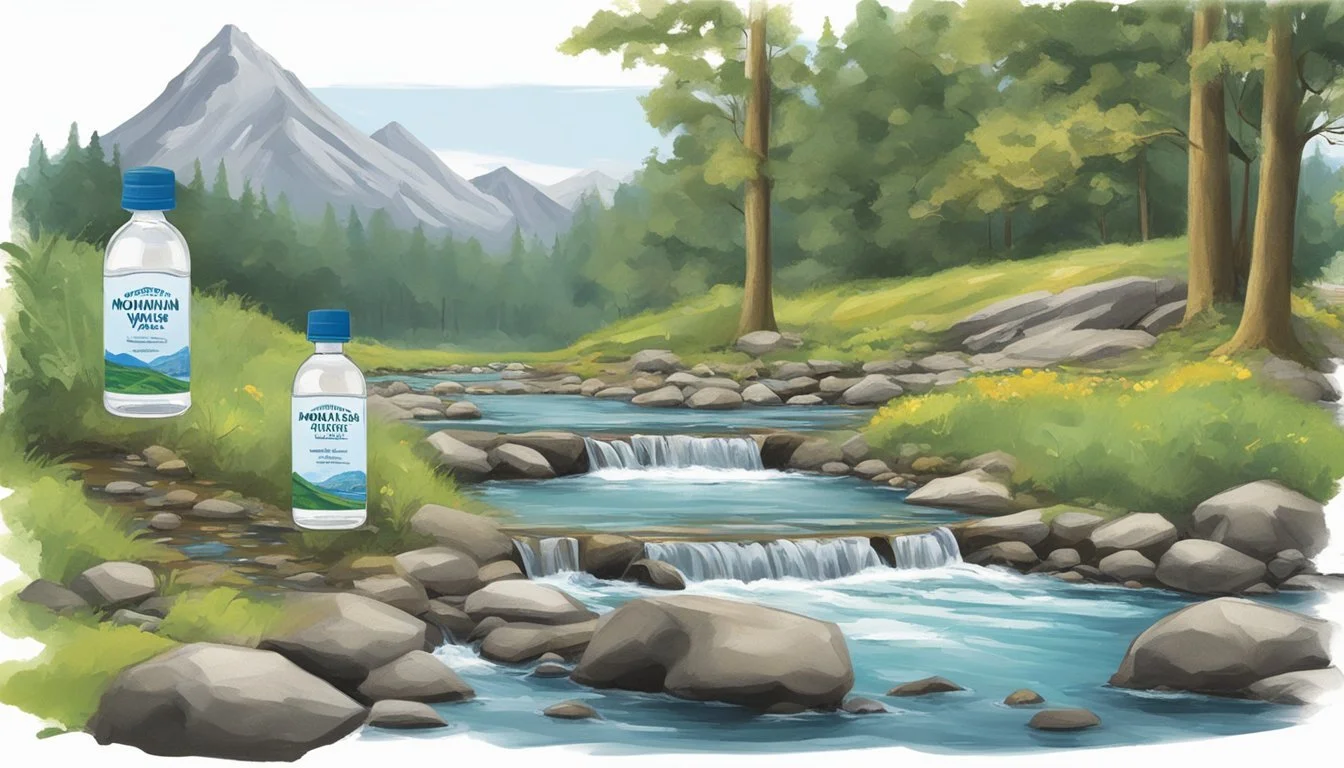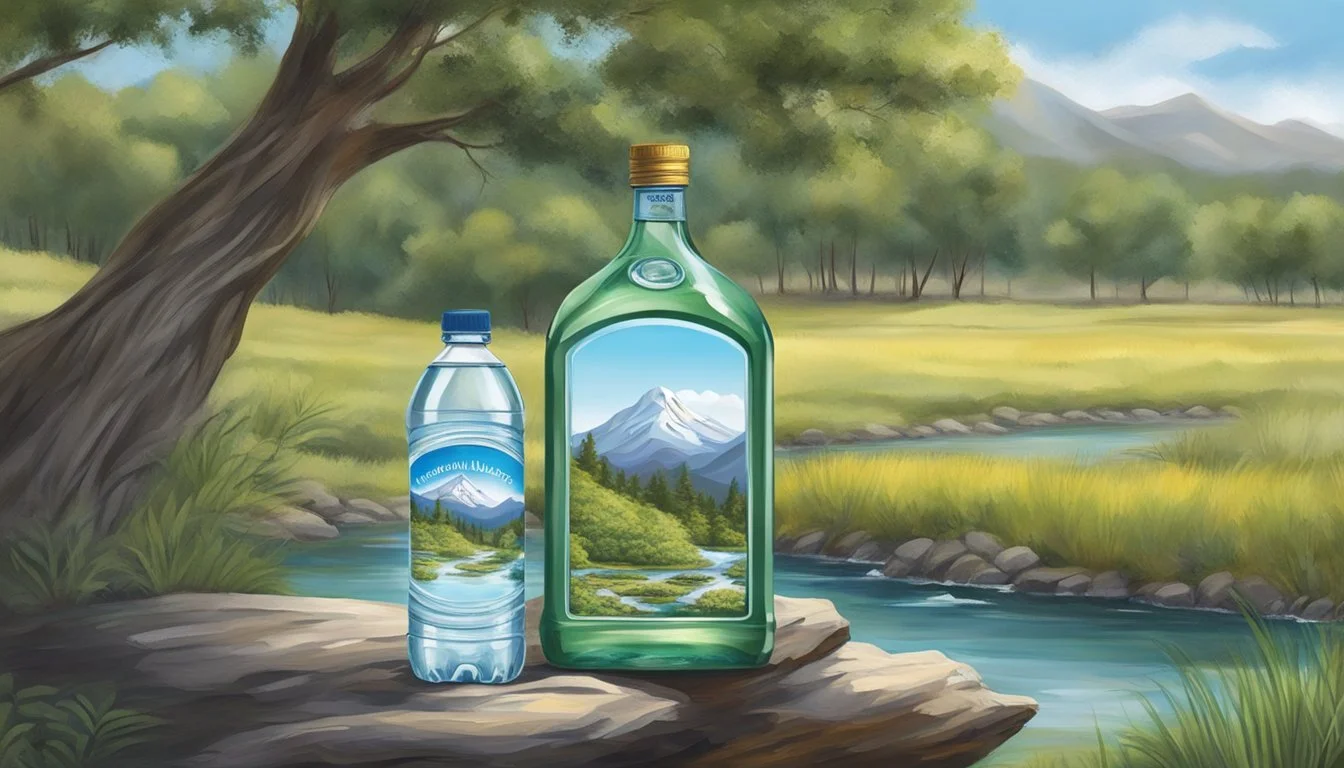Mountain Valley Spring Water vs. Zephyrhills
A Comprehensive Comparison
In the world of bottled water, consumers are faced with abundant choices, each brand promising purity, taste, and convenience. Among the plethora of options, Mountain Valley Spring Water and Zephyrhills are two brands that have garnered loyal followings. They offer distinct sources and taste profiles that cater to the preferences of different demographics. The quest for the superior bottled water between these two is not just about the flavor, it also encompasses factors like sourcing, packaging, and ecological impact.
Mountain Valley Spring Water is prized for its unique origin, hailing from the Ouachita Mountains of Arkansas. The brand boasts a natural filtration process through limestone that enriches the water with a balance of minerals, giving it a crisp, refreshing taste that has been celebrated for over a century. This natural spring water is not only a staple in homes but is also favored in high-end restaurants and among connoisseurs.
Zephyrhills, hailing from Florida's Crystal Springs, is another prominent contender in the bottled water market. It offers a taste of Florida's natural springs and has been a regional favorite for a vivid representation of the local terroir. With its focus on sustainability, Zephyrhills states that their bottles are made with recycled materials, aiming to reduce environmental impact while delivering pure, spring-sourced water to its consumers.
History and Origin of Brands
The historical roots of a bottled water brand can be a testament to its quality and heritage. Mountain Valley Spring Water and Zephyrhills are two brands with distinct origins that reflect their journey in the bottled water market.
Mountain Valley Spring Water
Mountain Valley Spring Water has its origins in Hot Springs, Arkansas, and boasts a long history dating back to 1871. It is bottled at the source in an area surrounded by rich, protective forests. The water originates from a natural spring that is shielded by layers of limestone, which naturally filter the water and impart minerals. Through its journey over time, Mountain Valley Spring Water has won accolades, such as a first-place tie in the Berkeley Springs International Water Tasting event, underscoring its reputation.
Zephyrhills
In contrast, Zephyrhills Natural Spring Water hails from the Floridan Aquifer in the city of Zephyrhills, Florida. The water is drawn from natural springs that are believed to be filtered through volcanic rock which enriches the water with minerals. The brand started bottling water in 1964 and quickly became a staple in the southeastern United States. Zephyrhills prides itself on providing water that reflects the purity and essence of its natural Florida sources.
Water Sourcing and Natural Filtration
Evaluating bottled water brands like Mountain Valley Spring Water and Zephyrhills involves analyzing where they source their water and understanding their filtration processes. These factors are crucial for assessing overall water quality and purity.
Source Comparisons
Mountain Valley Spring Water originates from a natural spring in the Ouachita Mountains of Arkansas. This spring water emerges from the earth having filtered through granite-based aquifers. The source is known for its unique composition and the natural filtration afforded by the rich geological formations of the region.
Zephyrhills, on the other hand, is sourced from various natural springs in Florida, primarily distributed in Pasco County. The water from these sources is considered groundwater and is naturally filtered through limestone which can confer a different mineral composition.
Filtration Process
Mountain Valley Spring Water boasts a filtration process that is primarily natural due to the water percolating through dense layers of lava rock resulting from ancient volcanic eruptions. This process not only purifies the water but also enriches it with a variety of minerals.
Zephyrhills implements various modern filtration methods after the initial natural filtration through limestone. The brand focuses on maintaining the natural balance and taste of the spring water while ensuring adherence to established water quality regulations.
Health and Safety Standards
In evaluating Mountain Valley Spring Water and Zephyrhills, it is critical to consider their mineral content and adherence to health and safety regulations. These factors significantly influence the quality and safety of bottled water.
Mineral Content and Health Benefits
Mountain Valley Spring Water is well-known for its rich mineral content. It provides essential minerals such as calcium, magnesium, and potassium, which are vital electrolytes for hydration and overall health. The presence of these minerals enhances the water's taste and contributes to the dietary intake of consumers.
Zephyrhills, sourced from Florida springs, also contains beneficial minerals, although the specific electrolyte levels may vary based on the source spring. The brand ensures a balance of minerals for taste and health, without adding any artificial ingredients.
Regulatory Testing and Safety
Bottled water is regulated by the Food and Drug Administration (FDA), ensuring that companies comply with specific health and safety standards.
Testing Protocols: Both Mountain Valley and Zephyrhills undergo regular testing for contaminants, including heavy metals and other potential pollutants.
Safety Records: Each brand maintains compliance with FDA regulations, with test results often accessible to the public to confirm their safety standards.
PFAS Chemicals: Recent scrutiny addresses concerns over per- and polyfluoroalkyl substances (PFAS) in bottled water. Tests on various brands have detected PFAS, but levels in Mountain Valley and Zephyrhills remain within EPA advisory limits when detected.
Overall, both brands display a commitment to safety by proactively testing and adhering to the regulatory guidelines for bottled water.
Product Range and Varieties
When choosing between Mountain Valley Spring Water and Zephyrhills, one should consider the product range each offers, including options for still versus sparkling water as well as different flavor choices.
Still vs. Sparkling
Mountain Valley Spring Water provides customers with both still and sparkling water choices. They emphasize their source in the Ouachita Mountains and maintain natural mineral content in the waters they bottle.
Still Water: Available in glass or BPA-free plastic bottles, ranging in size from 333ml to 2.5 gallons.
Sparkling Water: Offered in classic, blackberry pomegranate, lime, white peach, and key lime flavors. Sizes vary from 333ml to 1 liter.
Zephyrhills, primarily known for their naturally sourced still spring water from Florida's springs, also offers sparkling water as part of their product line.
Still Water: Can be found in sizes from 8 ounces to 5 gallons, accommodating a variety of needs.
Sparkling Water: They offer original unflavored sparkling water in addition to lemon-lime, raspberry-lime, and black cherry options, most commonly available in 16.9-ounce bottles.
Flavor Options
Beyond the plain still and sparkling varieties, both companies offer a range of flavored water products to suit various tastes.
Mountain Valley Spring Water is known for its sparkling water with a range of natural flavors:
Flavors: Blackberry Pomegranate, Lime, White Peach, and Key Lime.
Zephyrhills also has flavored options but within its sparkling water line:
Flavors: Includes Lemon-Lime, Raspberry-Lime, and Black Cherry.
Both brands ensure that their flavored waters provide a refreshing alternative to their natural spring water while maintaining a focus on quality.
Environmental Impact and Sustainability
When examining the environmental impact and sustainability of Mountain Valley Spring Water compared to Zephyrhills, one must consider the materials used for bottling as well as the management of their respective water sources. Both factors significantly impact their ecological footprints.
Bottle Materials and Recycling
Mountain Valley Spring Water is known for using reusable glass bottles, which offer an eco-friendlier option when compared to single-use plastics. Glass is fully recyclable, and its reuse contributes to reducing waste and the demand for new materials. However, the production and recycling processes for glass are energy-intensive, and the heavier weight adds to transportation emissions.
In contrast, Zephyrhills primarily packages its water in plastic bottles made with BPA-free PET (polyethylene terephthalate), which is recyclable. Despite being less harmful than other plastics, the recycling rates for PET are not at 100%, leading to environmental concerns such as pollution.
Material Comparison:
Mountain Valley: Reusable Glass
Zephyrhills: BPA-free PET
Water Source Management
The stewardship of natural water sources is crucial for the sustainability of bottled water brands. Mountain Valley Spring Water sources its water from a natural spring in Arkansas, emphasizing the protection and sustainable management of its source. The company has established environmental protection policies to ensure the long-term viability of the spring.
Zephyrhills, a Nestlé-owned brand, draws water from Floridian springs. Nestlé's water extraction practices have raised questions about sustainability and impact on local ecosystems. The company asserts that it follows rigorous resource management to minimize environmental impact. Regardless, public scrutiny highlights the importance of transparent and sustainable water sourcing.
Source Management Practices:
Mountain Valley: Protective environmental policies
Zephyrhills: Rigorous resource management (amid scrutiny)
Taste Profile and Consumer Preferences
When it comes to bottled water, the taste is often influenced by mineral content, and consumers' preferences can vary widely. Different brands like Mountain Valley Spring Water and Zephyrhills have distinct taste profiles that cater to these preferences.
Mineral Taste
Mountain Valley Spring Water is known for its unique mineral taste due to its source in the Ouachita Mountains. It contains a variety of minerals, including calcium, magnesium, and potassium, which contribute to its slightly alkaline pH and a taste that can be described as crisp and refreshing. In contrast, Zephyrhills, sourced from Florida's springs, tends to have a milder mineral profile, which results in a softer and cleaner taste. The presence of minerals is not only a key factor in the taste of the water but also contributes to the overall mouthfeel.
Consumer Water Taste Tests
Consumers often participate in water taste tests to express their preferences. While subjective, these tests reveal trends in consumer choices. Brands like Poland Spring and Nestlé Pure Life are frequently included in such taste tests due to their widespread availability and differing taste profiles. For example, Poland Spring, a natural spring water from Maine, is typically characterized by consumers as having a neutral taste, which may appeal to those preferring a more understated flavor. On the other hand, Nestlé Pure Life, which undergoes a multi-step purification process, offers a consistent and clean taste, free from strong mineral flavors.
Consumer preferences in these tests are reflective of both the individual's palate and the specific characteristics of the waters being compared. Taste, as a subjective measure, is influenced by the perceived purity and the balance of minerals present in the water.
Price Point and Accessibility
When comparing Mountain Valley Spring Water and Zephyrhills, consumers often consider price and how easily they can purchase these products. These factors are crucial in making an informed choice on bottled water.
Affordability
Mountain Valley Spring Water is often perceived as a premium brand, and its pricing reflects that status. It is generally more expensive than Zephyrhills, with prices varying depending on the size of the bottle and point of purchase. In contrast, Zephyrhills, which is sourced from Florida's springs, tends to be more affordable and is competitively priced with mainstream brands such as Dasani.
A comparison of standard 500ml bottles (sourced from typical retail outlets as of the knowledge cutoff in 2023):
Brand Price Range per 500ml bottle Mountain Valley $1.50 - $3.00 Zephyrhills $1.00 - $2.00 Dasani $1.00 - $1.50 Voss (comparative) $2.50 - $3.50
Availability in Markets
Zephyrhills benefits from wide distribution through its parent company, Nestlé Waters, making it commonly found in supermarkets, convenience stores, and vending machines. The brand has strong market presence in the southeastern United States but is also available nationwide. Mountain Valley Spring Water has a more selective availability, mainly located in specialty stores, health food markets, and online. Though not as ubiquitous as Zephyrhills, it maintains a loyal following that values its source and packaging.
Both brands may also be found in select convenience store chains, although Mountain Valley might be less prevalent in this type of outlet compared to Zephyrhills and brands like Dasani and Voss, which have secured broad distribution networks conducive to convenience and immediate purchase.
Comparative Analysis of Water Quality
Selecting the appropriate bottled water is crucial, and it often depends on the water quality each brand offers. Analyzing Mountain Valley Spring Water and Zephyrhills, the comparison will focus on their pH levels and alkalinity, along with the presence of contaminants and overall purity.
pH Levels and Alkalinity
Mountain Valley Spring Water boasts a pH ranging from 7.3 to 7.7, which is slightly alkaline. The water comes from a natural spring source in the Ouachita Mountains, Arkansas, where it naturally acquires its minerals and alkaline nature.
Zephyrhills is sourced from various springs in Florida and typically offers water that is considered neutral to mildly alkaline, although the exact pH levels can vary depending on the specific source.
Alkaline water has a pH level above 7 and is thought to contribute to neutralizing acid in the bloodstream, providing benefits like improved metabolism and increased energy.
Presence of Contaminants and Purity
Mountain Valley Spring Water undergoes natural filtration and is protected within 2,000 acres of forest, minimizing the risk of contaminants. The brand has not publicly reported issues with contaminants and adheres to the FDA's standards for bottled water.
Zephyrhills follows a multi-step purification process that can include filtration and reverse osmosis, ensuring a high level of purity. They also perform numerous quality tests on their water to comply with both state and federal regulations for purified drinking water.
Both brands avoid the presence of contaminants through stringent processes and provide bottled water options that meet or exceed quality standards. Mountain Valley emphasizes its long-standing natural source, while Zephyrhills relies on advanced purification techniques like reverse osmosis to ensure purity.
Brand Perception and Marketing
Brand perception and marketing play an essential role in how consumers choose their bottled water. These aspects can often sway a buyer's decision, and both Mountain Valley Spring Water and Zephyrhills have their unique approaches to establishing a place in the market.
Advertising Strategies
Mountain Valley Spring Water has historically emphasized its heritage and the quality of its natural spring water in its marketing efforts. Characteristics such as a balanced pH and mineral content have been spotlighted to show its premium nature. On the other hand, Zephyrhills, owned by Nestlé, launches campaigns that focus on its own local sourcing, often highlighting the brand's Floridian roots.
The use of advertising varies between brands:
Mountain Valley Spring Water: Leverages its long history since 1871 through storytelling.
Zephyrhills: Concentrates on a regional approach, connecting its brand to Florida's natural springs.
Consumer Loyalty and Trust
Consumer loyalty is pivotal for bottled water brands. Mountain Valley Spring Water garners trust through its transparent communication of water sources and consistent quality. Zephyrhills has built its brand loyalty by being a recognized name in the southeast, assuring customers of its local and sustainable extraction methods.
Both brands face competition from Coca-Cola's Smartwater, which uses vapor distillation as a unique selling point. Coca-Cola has a significant marketing budget, allowing Smartwater to present itself as an innovative and technological advanced choice. Trust has also been cultivated by Coca-Cola's longstanding reputation and its association with trends and lifestyle branding.
These brands invest in strategies that not only push for immediate sales but also strive to create a long-lasting reputation. Brand trust is earned over time and is often a direct result of how bottled water companies market themselves as well as how they operate.
Final Verdict
When evaluating Mountain Valley Spring Water and Zephyrhills, consumers should consider the source, purity, taste, and their specific hydration needs.
Mountain Valley Spring Water is often praised for its purity and mineral content, sourced from a natural spring in Arkansas. It is bottled at the source and offers a consistently clean taste. The brand has a dedicated following and is favored by those who prefer spring water with a unique mineral composition that contributes to both hydration and taste.
Zephyrhills, sourced from Florida springs, is another good choice for staying hydrated. Its regional availability makes it a convenient option for those living in the southeastern United States. While Zephyrhills maintains a natural filtration process, some may find the taste less distinctive than Mountain Valley.
Feature Mountain Valley Spring Water Zephyrhills Source Natural spring in Arkansas Florida springs Mineral Content Rich Standard Taste Clean, unique mineral flavor Clean, less distinct Hydration Properties High-quality minerals Good
One is not definitively the "best" bottled water, as preference varies. For those who prioritize taste and mineral content, Mountain Valley may be a better fit. If one is looking for reliable hydration from a regional brand with good quality control, Zephyrhills could be the preferred choice.
The bottom line is that both brands offer quality water suitable for hydration. The final selection depends on individual taste and values such as the source and mineral content.









